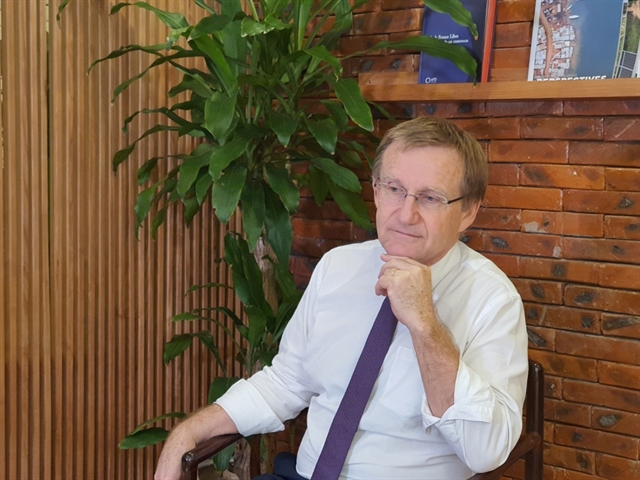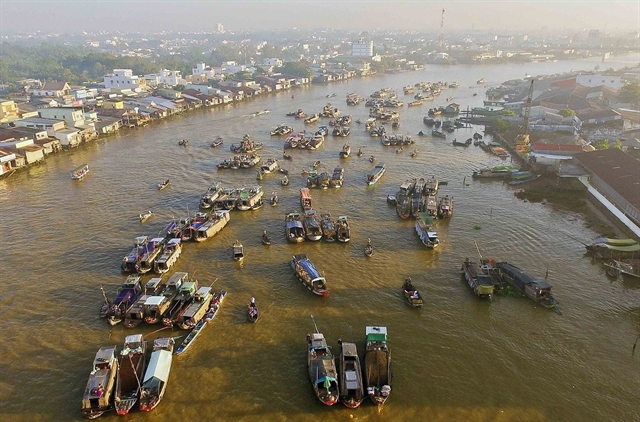.jfif) Opinion
Opinion

Hervé Conan, director of the French Development Agency (AFD) in Việt Nam speaks to the press about climate change in the country and the project GEMMES Việt Nam.

|
| Hervé Conan, director of the French Development Agency (AFD) in Việt Nam. — VNS Photo Nhật Hồng |
Hervé Conan, director of the French Development Agency (AFD) in Việt Nam, spoke to the press about climate change in the country and the project GEMMES Việt Nam. A collaboration between the Vietnamese Government and AFD, GEMMES aims to measure the socio-economic impacts of climate change and adaptation strategies in the Southeast Asian nation.
How will AFD support Việt Nam's long-term development in regards to climate change?
The focus is on the long term impact of climate change on the city. In particular, we are focusing on the flooding aspect, and also on coastal erosion. It is clear that for these aspects we don’t only take into account the current situation, but we need to take into account the situation that will happen in 50 years and more, which will be affected by climate change.
So for example for the infrastructure, we are supporting the design process based on the impact of climate change and the rain that we will be having in the long term. For the coastal erosion, we are taking into account the sea level increase that we will have. And for the water resources management, we are taking into account that some parts of the country will have more water, and some parts less water. So this is the way to tackle the issues in the long term, and not to design for the current situation but to design all the projects on the future situation.
Việt Nam is adopting a new energy strategy towards 2045 which focuses on renewable resources. How can AFD contribute to renewable energy regulations?
The role of AFD, I think as the other donors, is to use our experience from all over the world. And because we are a bilateral agency, it is also to use the specific experience that we have in France to facilitate a peer-to-peer approach, to have professionals speaking together, and to support and to explain to Việt Nam what has been done in France, what has been done in other countries – just to have some benchmark and experience to provide what works in different countries, what fails in different countries – and to support ministries and the Government to take the most appropriate solutions for Việt Nam based on the lesson learnt in other countries.
How do you think AFD can provide and transfer knowledge to support Việt Nam in developing a feasible policy on renewable energy?
We hope to be in a position to support Việt Nam in its ambitious but necessarily needed strategy, which is supposed to take into account the different experiences we have.
What we are discussing right now with EVN (Vietnam Electricity), which is a partner, is to focus on two aspects: we need to focus on the way to develop new projects using renewable energy. And these projects, based on renewable energy, suppose to develop and enable the environment for the private sector to invest in this renewable energy.
You have also a big infrastructure needed for energy, in particular hydroelectricity. So that is more of a dialogue with EVN by itself, to develop such infrastructure. But whatever happens, what is important is to have a system that works. And to have a system that works, it needs two things: renewable energy is important to replace coal, and later on to replace gas. But in fact, you need the backbone which is agreement – agreeing that we will accept the different energy. So we need to strengthen that, and this is part of the dialogue we have with EVN. It's a dialogue which we support by the French experience, and the RTE – which is a French company focusing on transmission grids.
The second is, renewable energy – when we speak about solar or wind energy, it is intermittent energy, which means you don't have it 24 hours per day. So it supposes to have a good system to back up the demand for energy. This is what we are discussing with EVN to both support the design of the global energy plan, and to support financially with some investment that we donated.
How does the GEMMES project support ministries and local authorities in climate change response and disaster prevention in medium and long-term socio-economic development plans?
I can say that GEMMES doesn't give figures globally, you have a global figure impact depending on GDP, depending on the increase of temperature. But it's also at the scale of provinces, the scale of small countries, of smaller communities, municipalities.
So that means that you can zoom in on the specific location to know what climate change will affect the water resources, for example. We know currently that in fact, climate change will have a positive impact on hydropower production, because we will have more water in the mountainous area where we have different dams.
So this is important also to know that you will have more water to manage, and it's important to take that into account for your infrastructure when we have more water behind. But we know also at the same time that we will have less water in some places, which supposes to transfer the water from one place to another place. We know also that the temperature will increase more in some areas of Việt Nam than in others. And we know if you have an increase in temperature, you have more disease.
So all these figures have been done globally, but also we can say locally to give some interesting input for the different policymakers to make the best decision they can based on the figures we provide.

|
| Mekong Delta is forecast to be one of the regions in Việt Nam most affected by climate change. — VNA/VNS Photo An Hiếu |
What is your evaluation on Việt Nam’s response to climate change impacts that are happening in the country?
I think that what Việt Nam has committed to COP26 is clearly a very ambitious commitment. And it's difficult for Việt Nam to have such high commitment at a time when they also aim for strong economic development, which requires energy. Therefore, it is needed to shift quickly from thermal energy production – coal or gas – to renewable energy.
At the same time, it is important for Việt Nam to be proactive and ambitious because it is one of the most vulnerable countries regarding climate change. I think that ambition is important, and the way that the Prime Minister is arranging everything, aligning all the strategies to this commitment is in the right direction. This year 2022 is in fact the transition year to adapt and align all the policies to this new commitment.
I think it's a very important decision. It is also why it is the role of international agencies like AFD to support the Vietnamese ministries and Government to align their strategies in the best way. What we can provide is lessons learnt from other countries, our experience in France in particular, to try to give the best information we can to the country, to be sure that the way we implement this strong commitment would be the best and the most efficient. — VNS




